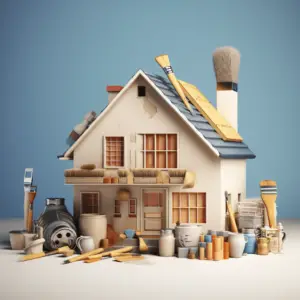Maximizing the benefits of home maintenance requires a systematic approach. This means a comprehensive plan to make sure your home stays in excellent condition. Inspections, cleaning and maintenance, and timely repairs are key parts of this plan.
Regular inspections are essential to spot issues before they become costly problems. Check the roof & plumbing for leaks, or the electrical wiring for wear and tear. Cleaning surfaces often keeps them looking good and prevents dirt and grime from damaging them. Maintenance of HVAC and appliances keeps them working well and extends their life.
Don’t ignore minor repairs – deal with them promptly to prevent further damage and extra expenses. Record all maintenance and repairs for reference. This helps you stay organized and can be used to show off the property when selling.
By following these guidelines and investing time in home maintenance, you’ll safeguard the value and longevity of your property. So, start today and take charge of preserving your home.
Table of Contents
Importance of a Home Maintenance Routine

It is vital to have a regular home maintenance routine. This will save time, money and avert big repairs. It also helps to spot problems early on. To make the most of your routine, it’s important to check different parts of your home.
Examine HVAC systems for optimal performance and energy efficiency. Check plumbing for leaks and repair them quickly to avoid water damage and mold. Inspect the roof for damage or wear to stop costly leaks.
Also, take care of your home’s exterior. Clean gutters and downspouts to stop water buildup and damage to the foundation. Check doors, windows and seals to maintain energy efficiency and prevent drafts.
Keep records of warranties, manuals and service records. This will make future repairs and upgrades easier.
It’s best to be proactive with home maintenance, as prevention is better than cure. Scheduling regular inspections and fixing minor problems promptly will prevent big breakdowns and costly repairs.
Following these steps and having a systematic approach to your home maintenance will keep your property in great shape. It will also enhance your living experience and preserve the value of your investment.
Steps to Get the Most Out of Your Home Maintenance Routine
Make the most of your home maintenance routine with these four steps!
- Prioritize: Make a list of all the necessary tasks. Focus on the essentials first, like checking for leaks or electrical issues. This way, you’ll avoid potential problems down the line.
- Make a Schedule: Assign specific dates or timeframes to each task. This will keep you organized and make sure you don’t miss any maintenance tasks.
- Inspect Your Home: Inspect regularly for signs of moisture, cracks, or dysfunctional appliances. Identifying and addressing issues promptly can stop them from becoming expensive repairs.
- Get Professional Help: For complex electrical or plumbing issues, hire experts. Investing in professional help when needed saves time, money, and headaches.
Also, don’t forget recurring maintenance tasks, such as cleaning gutters, changing air filters, and ensuring ventilation. By following these suggestions, your home will stay in excellent condition for years to come.
Tips for Efficient and Effective Home Maintenance
It’s crucial to keep up with home maintenance to keep your house in tip-top shape and dodge pricey repairs. Here are some hints to make the most out of your maintenance routine:
- Inspect and clean gutters frequently. Blocked gutters can cause water damage, so get rid of any debris and guarantee proper water flow. Install a gutter guard to minimize future blockages.
- Check your HVAC system. Switch air filters and schedule annual maintenance for your heating and cooling systems to improve their efficiency, extend their lifespan, and dodge unexpected breakdowns.
- Stay on top of pest control. Preventive steps like sealing entry points, cleaning food spills quickly, and getting rid of standing water will help combat pests. Consider hiring professional pest control services for more effective results.
Plus, here’s more advice to optimize your home maintenance routine:

- Don’t neglect small leaks. Even tiny leaks can cause major damage over time. Check faucets, pipes, and fixtures regularly for any signs of leakage and address them directly.
- Maintain outdoor spaces. Taking care of outdoor areas is just as important as maintaining indoors. Mow the lawn, trim trees and shrubs, and clean exterior surfaces to amplify curb appeal and prevent property damage.
- Keep an eye on electrical systems. Look out for loose connections or signs of overheating while inspecting electrical outlets. Addressing these issues can stop electrical fires or power outages.
As you focus on home maintenance, don’t forget self-care! Take breaks when necessary and call in a professional for complex maintenance tasks. By following these tips, you can make sure your home is well-kept and create a safe haven you’ll be proud of.
Now that you have some useful advice to optimize your home maintenance routine, start implementing them. Take action now to dodge potential issues and reap the benefits of a well-maintained home. A bit of effort now can save you from costly expenses and stress later. Embrace the power of preventive maintenance and upgrade your living experience!
Conclusion
For optimal home maintenance, a few key strategies should be followed. Six to keep in mind:
- Inspect your home regularly for signs of wear and tear, tackling issues quickly.
- Set up a cleaning schedule to remove dust, dirt, and grime.
- Change air filters, check smoke detectors, and service your HVAC system.
- Invest in good tools and materials for effective, long-lasting maintenance.
- Set aside a budget for maintenance expenses.
- Outsource certain tasks to the experts.
Remember, each home is different. Customize your approach to your home’s needs for maximum longevity and minimal issues.
Interesting fact: a study by HomeAdvisor shows that regular home maintenance can increase property value by up to 10%! Investing in maintenance is beneficial.
Frequently Asked Questions
Q: How often should I perform home maintenance tasks?
A: It is recommended to perform regular home maintenance tasks at least once every three months. This ensures that your home is well-maintained and prevents any potential issues from becoming major problems.
Q: What are some important home maintenance tasks that should not be neglected?
A: Some important home maintenance tasks that should not be neglected include checking and cleaning gutters, inspecting and replacing air filters, testing smoke detectors and carbon monoxide alarms, and ensuring proper insulation in the attic.
Q: How can I maximize the lifespan of my appliances?
A: To maximize the lifespan of your appliances, it is important to clean and maintain them regularly. This includes removing any debris, dust, or lint that may accumulate, checking and replacing filters as needed, and following the manufacturer’s recommended maintenance guidelines.
Q: Should I hire professionals for home maintenance tasks?
A: It depends on the complexity of the task and your own expertise. While some home maintenance tasks can be easily performed by homeowners with basic skills, others require specialized knowledge and equipment. It is advisable to hire professionals for tasks such as electrical work, HVAC system maintenance, and plumbing repairs.
Q: How can I stay organized with my home maintenance routine?
A: One way to stay organized with your home maintenance routine is by creating a schedule or checklist. Break down tasks by frequency (e.g., monthly, quarterly, annually) and mark them on a calendar or use a digital reminder. This ensures that you don’t miss any important tasks and helps you stay on top of your home maintenance routine.
Q: Why is regular home maintenance important?
A: Regular home maintenance is important because it helps prevent small issues from turning into costly repairs. It also ensures that your home remains safe, comfortable, and efficient. By identifying and addressing problems early on, you can save money in the long run and extend the lifespan of your home’s components.